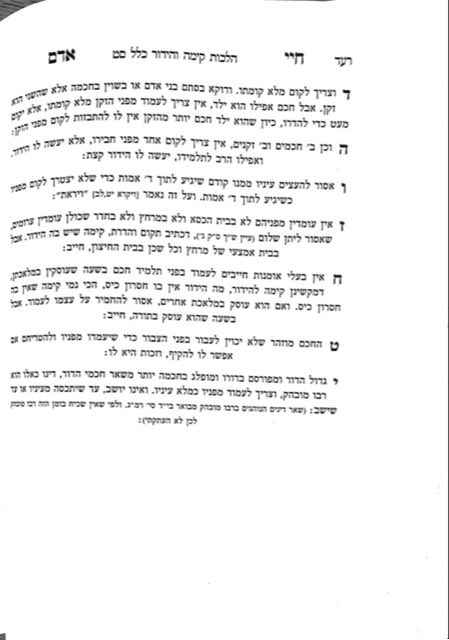We are beginning siman 6. The Chayei Adam writes, based on a Gemara, that it is assur for one to close their eyes when a talmid chacham (or seivah) are about to pass. The pasuk which teaches us the chiyuv for kimah and hiddur ends with veyareisa mei’elokecha, that regarding this mitzvah one should have fear of Hashem. Obviously, all mitzvos require fear of Hashem. Rashi explains that Hashem is coming to teach us that even though one may have a tendency to fool these people, Hashem reminds us that He knows the truth, even if we are successful in fooling another person. The Torah uses this phrase, and Rashi makes this comment in other, similar places where a person is more likely to think they can fool others around them.
It is interesting to note that the Chayei Adam uses the language of assur to describe one who acts in this way. There are other places in which this idea applies, where one was chayav in a mitzvah, but they gave off the impression to those around them that they were patur. However, in those places, the person was actually chayav in the mitzvah they were avoiding. The language of the Chayei Adam of assur implies that a person would truly be patur, but it is assur to put oneself in such a situation, because it was otherwise unnecessary for the Chayei Adam to state it is assur.
To explain, it seems that the Chayei Adam feels that as we know that the chiyuv of kavod is kimah together with hiddur. If there is no hiddur, because, for example, the individual shuts their eyes, there is no chiyuv of kimah either. Thus, one is technically patur, as the Chayei Adam implied. Nevertheless, the Chayei Adam’s point is that it is assur to put oneself in such a situation, meaning to create the subterfuge to avoid standing up.
However, we learned (shiur 1325) that some hold regarding kibbud av v’eim that one is chayav to give kavod to their parent even before they see them. For example, the Gemara says that Rav Yosef, who was blind, would stand up when he heard his mothers footsteps. According to those opinions, the chiyuv of kibud av v’eim is on the individual, regardless of whether the kavod is shown to the parent (or to other viewers). Apparently, the Chayei Adam understands that this is not so regarding kavod for talmidei chachamim, and that the chiyuv is only when the action is clear to its recipient or to other viewers. This is why it is possible to patur oneself from the mitzvah, and why the Chayei Adam stresses that it is assur to put oneself in such a situation.
Summary
It is assur to put oneself in a situation in which they will be exempt from demonstrating kavod to a talmid chacham or seivah.



